[Dec 2007, Volume 4 Quarterly Issue] Pdf File size - The IIPM Think ...
[Dec 2007, Volume 4 Quarterly Issue] Pdf File size - The IIPM Think ...
[Dec 2007, Volume 4 Quarterly Issue] Pdf File size - The IIPM Think ...
Create successful ePaper yourself
Turn your PDF publications into a flip-book with our unique Google optimized e-Paper software.
MORE MARKETS, LESS GOVERNMENT<br />
their needs by acquiring the rights of<br />
those who are using water for low-value<br />
purposes.<br />
“....there are strong incentives for<br />
those using water for low-value purposes<br />
to voluntarily give up their rights,<br />
making reallocation politically attractive<br />
and practical.”<br />
<strong>The</strong> Water Sector Review 1998’s Report<br />
on Intersectoral Allocation gives<br />
the example of Chennai. It says 8 :<br />
“As in all parts of the world, the value<br />
of water for irrigated foodcrops is a fraction<br />
of the value for urban and domestic<br />
purposes. Rough calculations suggest<br />
that the value of water in irrigation in<br />
Tamil Nadu is less than Rs. 0.5/cubic<br />
meter. Even if Metrowater could pay several<br />
times this amount, it could obtain<br />
additional water….<br />
“<strong>The</strong> potential for voluntary inter-sectoral<br />
transfer of water to urban users<br />
from irrigation provide a promising low<br />
cost alternative...”<br />
Thus, the Bank argues that in a water<br />
market, the farmer would find it more<br />
profitable to sell his share of water to the<br />
city (or an industry, or a golf course)<br />
than to grow crops.<br />
One of the first ‘trials’ of this approach<br />
is taking place in Maharashtra. <strong>The</strong> Maharashtra<br />
Water Resources Regulatory<br />
Authority Act (MWRRA) 2005 came<br />
into force on 8th June 2005. Maharashtra<br />
soon became the first, and so far the<br />
only, state to set up the Water Resources<br />
Regulatory Authority - more or less<br />
on the lines of the regulatory commissions<br />
set up for electricity in various<br />
states - with objectives that include fi x-<br />
ing the rates for use of water for agriculture,<br />
industrial, drinking and other purposes<br />
and several related matters.<br />
Among the functions of the Authority is<br />
the mandate to develop a framework for<br />
trading in water entitlements. <strong>The</strong> Authority<br />
is to determine the distribution<br />
of entitlements between various users,<br />
and then these entitlements can be<br />
“transferred, bartered, bought or sold<br />
on annual or seasonal basis within a<br />
market system” 9 to be created by the Authority.<br />
<strong>The</strong> Authority has already begun<br />
the exercise of setting up entitlements in<br />
six irrigation projects in Maharashtra on<br />
a pilot basis, inlcuding tow major projects.<br />
Will such an exercise lead to a rational<br />
and efficient allocation of water?<br />
While the economic argument that water<br />
will be allocated to the highest valueadding<br />
user looks attractive, there are<br />
likely to be serious implications. For example,<br />
if a farmer finds it more profitable<br />
to sell his share of water to industry<br />
or a near by city – and this happens on a<br />
large scale, what are the implications for<br />
food security? What would happen to<br />
associated rural economic activity? For<br />
example, agricultural residues provide<br />
fodder for cattle, but if a farmer does not<br />
cultivate his land, what happens to the<br />
cattle? Another important question is<br />
related to the conversion of livelihood to<br />
cash. <strong>The</strong> farmer, by cultivating his land,<br />
gets the output in the form of grain,<br />
food, milk and some cash. By selling his<br />
water right, this is likely to be largely<br />
Market driven inter-sector allocation poses more serious<br />
broader concerns. Water is not just an economic commodity<br />
– it is essentially an ecological, natural entity, and<br />
water as an ecological system is vast and complex<br />
converted to cash. This has the danger<br />
of being spent on careless consumptive<br />
expenditure, or worse, on liquor and<br />
other addictions. More cash can also<br />
mean that women will have lesser<br />
control on the household income as cash<br />
is more likely to be controlled by<br />
the men.<br />
Apart from these individual-related<br />
issues, market driven inter-sector allocation<br />
poses even more serious broader<br />
concerns. First of all, water is not just an<br />
economic commodity – it is essentially<br />
an ecological, natural entity, and water<br />
as an ecological system is vast and complex.<br />
Water – and water bodies like rivers,<br />
lakes etc. – have many cultural, social<br />
and religious associations. Thus,<br />
there are many externalities associated<br />
with water, and it is simply not possible<br />
for market mechanisms to address these.<br />
Consider (as is happening in several<br />
places like Chennai) if a farmer wants to<br />
sell his groundwater to the city instead<br />
of farming. But unrestricted withdrawals<br />
by the farmer could affect the wells<br />
of the neighbouring farmers. Or, consider<br />
whether the waters of a river that<br />
THE INDIA ECONOMY REVIEW<br />
49


![[Dec 2007, Volume 4 Quarterly Issue] Pdf File size - The IIPM Think ...](https://img.yumpu.com/29766298/48/500x640/dec-2007-volume-4-quarterly-issue-pdf-file-size-the-iipm-think-.jpg)
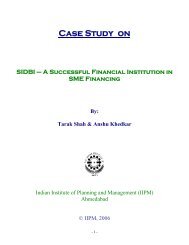
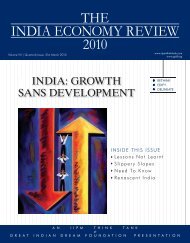
![[Feb 2008, Volume V Annual Issue] Pdf File size - The IIPM Think Tank](https://img.yumpu.com/43961117/1/190x245/feb-2008-volume-v-annual-issue-pdf-file-size-the-iipm-think-tank.jpg?quality=85)
![[June 2008, Volume V Quarterly Issue] Pdf File size - The IIPM Think ...](https://img.yumpu.com/41693247/1/190x245/june-2008-volume-v-quarterly-issue-pdf-file-size-the-iipm-think-.jpg?quality=85)
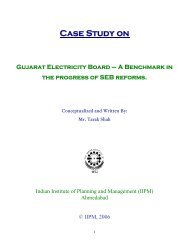
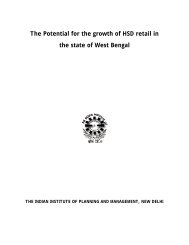
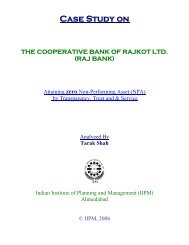

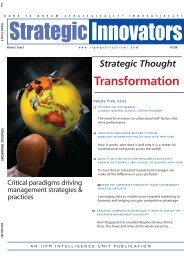
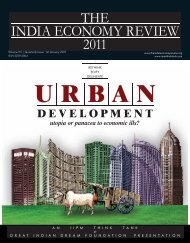
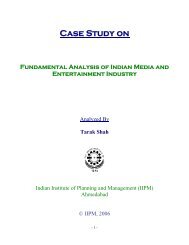
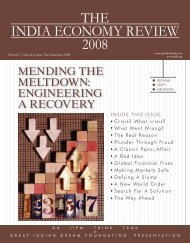
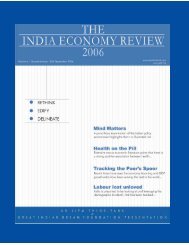
![[Volume VI | Quarterly Issue: 31st May 2009] Pdf File size](https://img.yumpu.com/27796051/1/190x245/volume-vi-quarterly-issue-31st-may-2009-pdf-file-size.jpg?quality=85)